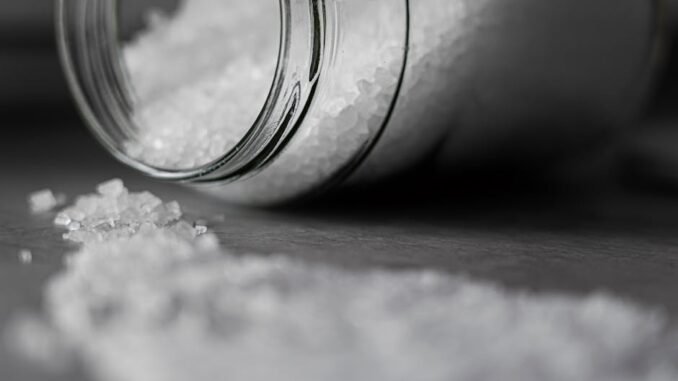
Summary
This article explores the surprising connection between high dietary sodium intake and obesity, particularly in adults. Researchers discovered that individuals with the highest sodium consumption had significantly increased odds of obesity. The findings highlight the importance of monitoring sodium intake for weight management and overall health. The study’s full results will be presented at the European Congress on Obesity in May.
Healthcare data growth can be overwhelming scale effortlessly with TrueNAS by Esdebe.
** Main Story**
Sodium and Obesity: A Surprising Connection
A recent study has revealed a startling link between high dietary sodium intake and an increased risk of obesity in adults. Researchers analyzing data from the National FinHealth 2017 Study found that participants in the highest quartile of sodium consumption had significantly higher odds of obesity compared to those in the lowest quartile. This association held true for both general obesity, measured by BMI, and abdominal obesity, determined by waist circumference. The study’s complete findings will be presented at the upcoming European Congress on Obesity in May.
The Research and its Implications
The FinHealth 2017 Study involved 2,222 men and 2,792 women aged 18 and older. Researchers used food frequency questionnaires to assess sodium intake and collected spot urine samples from a subset of participants to corroborate the findings. The results showed a strong correlation between high sodium intake and increased obesity risk. Women in the highest sodium quartile had a 4.3 times greater likelihood of general obesity and a 3.42 times greater likelihood of abdominal obesity compared to those in the lowest quartile. Similarly, men in the highest quartile faced a 6.05 times higher risk of general obesity and a 4.68 times higher risk of abdominal obesity compared to their low-sodium counterparts.
Understanding the Sodium-Obesity Link
While the exact mechanism linking sodium intake to obesity remains under investigation, one prominent theory points to the impact on thirst and fluid consumption. High sodium intake can trigger increased thirst, leading individuals to consume more fluids, often in the form of sugary drinks. These beverages contribute significantly to calorie intake and can promote weight gain over time. Additionally, some research suggests a direct link between high salt intake and metabolic changes that may contribute to obesity, independent of fluid consumption. These changes can include activation of certain pathways in the liver and hypothalamus, potentially leading to increased fat storage and appetite dysregulation.
Sodium and Geriatric Care: A Growing Concern
The findings of this study have significant implications for geriatric care, as older adults are particularly vulnerable to the health risks associated with both high sodium intake and obesity. As people age, their metabolism tends to slow down, making weight management more challenging. Additionally, older adults may be more susceptible to the blood pressure-raising effects of sodium, increasing their risk of cardiovascular disease. Therefore, promoting healthy sodium intake habits becomes crucial for maintaining overall health and well-being in the elderly population.
Strategies for Reducing Sodium Intake
Given the potential link between sodium and obesity, healthcare professionals and individuals alike can take steps to reduce sodium consumption. These include:
-
Choosing fresh, whole foods: Processed foods, fast food, and restaurant meals are often high in sodium. Emphasizing fresh fruits, vegetables, whole grains, and lean proteins can significantly lower sodium intake.
-
Reading food labels carefully: Paying attention to the sodium content listed on food labels can help individuals make informed choices about the foods they purchase and consume.
-
Cooking at home more often: Preparing meals at home allows for greater control over ingredients and sodium levels, reducing reliance on high-sodium processed foods.
-
Limiting added salt at the table and during cooking: Flavoring food with herbs, spices, and other low-sodium seasonings can enhance taste without adding excess sodium.
-
Advocating for lower sodium content in processed foods: Supporting initiatives to reduce sodium in commercially prepared foods can create a healthier food environment for everyone.
By understanding the potential impact of high sodium intake on obesity and overall health, individuals and healthcare providers can work together to promote healthier eating habits and reduce the burden of chronic diseases.


So, is this why I crave salty snacks after a workout? I always thought it was an electrolyte thing, but maybe my body is just cunningly plotting its next expansion. Guess I’ll swap the pretzels for… celery? Help! Any low-sodium snack recommendations?
That’s a great question! Electrolytes definitely play a role in post-workout cravings. However, this study suggests the link between sodium and obesity could also be a factor. For low-sodium snack ideas, maybe try some unsalted nuts or seeds? They’re packed with nutrients and can help curb those cravings.
Editor: MedTechNews.Uk
Thank you to our Sponsor Esdebe
So, if I understand correctly, cutting back on sodium might help manage weight, especially for older adults? I wonder if this explains why my grandma’s secret to longevity is just bland food. Maybe she was onto something!
That’s a really insightful point! It’s amazing how often traditional wisdom aligns with current research. Your grandma’s ‘bland’ diet might be a fantastic example of intuitive healthy eating! Perhaps a lower sodium intake contributed to her overall health and longevity. It would be interesting to research that further. Thanks for sharing!
Editor: MedTechNews.Uk
Thank you to our Sponsor Esdebe